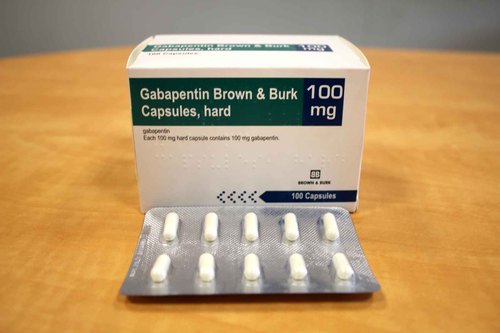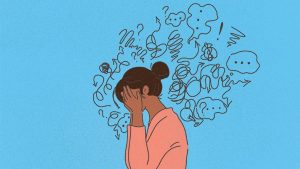Gabapentin is a drug that can be used to treat anxiety. It may also be prescribed for other conditions such as epilepsy, neuropathy, and restless leg syndrome. This article will talk about how gabapentin works and the side effects of this medication. We’ll also explore if it’s safe and effective in treating anxiety.
Contents
- 1 What Is Anxiety?
- 1.1 What Is Gabapentin?
- 1.2 How Does Gabapentin Work?
- 1.3 Does Gabapentin Work for Everyone?
- 1.4 Side Effects of Gabapentin
- 1.5 What Are The Common Side Effects For People With Mental Illness?
- 1.6 How Long Does It Take for Gabapentin to Work?
- 1.7 What Are The Dosage And Administration?
- 1.8 How Long Does Gabapentin Last?
- 1.9 How To Discontinue The Gabapentin?
- 1.10 How To Help Someone With Gabapentin Overdose?
- 2 Conclusion
- 3 A Word From Therapy Mantra
What Is Anxiety?
We all get anxious at times. It’s a normal human emotion that originates in our brains and feels like nervousness or worry. Anxiety is caused by thoughts racing around, processing information too quickly for us to handle without getting overwhelmed, and then responding with physical symptoms such as tension headaches, nausea, and muscle tightness.
When you feel this way it can seem overwhelming because there are so many things happening inside of your head; however, the truth is that anxiety itself doesn’t hurt anyone physically. Although we often respond badly to being anxious (for example doing something rash which makes us even more upset). The actual feeling of anxiety isn’t dangerous on its own; rather it puts us into fight-or-flight mode when we really don’t need to be in that state.
What Is Gabapentin?
Gabapentin is a prescription drug that helps to reduce anxiety levels by acting as an inhibitory neurotransmitter in the brain. It’s been used for decades and has only had its most recent surge of popularity because it was released under many different brands all at once. Some people are using gabapentin without a doctor telling them to do so. They are taking the drug for problems like stress, worry, or nervousness. Doctors don’t know how well it works for these problems.
How Does Gabapentin Work?
Gabapentin binds to a specific receptor in the brain that helps to reduce anxiety levels. It’s not entirely understood how it does this, but there are many different theories about its mode of action.
- One theory is that gabapentin alters the way we process emotional information which reduces our overall response to stress and anxiety triggers.
- Another possibility is that gabapentin increases the amount of GABA (gamma-aminobutyric acid) in the brain.
- GABA is an inhibitory neurotransmitter which means it stops other neurons from firing and passing on messages. This can be helpful in cases of anxiety because when too much activity is happening in the brain, it can lead to the “fight or flight” response.
- A third theory is that gabapentin blocks certain receptors in the brain which stops adrenaline from being released. Adrenaline is responsible for many of the physical symptoms we experience when we are anxious, such as racing hearts and sweating.
Does Gabapentin Work for Everyone?
There is no one-size-fits-all answer to this question because everyone experiences anxiety differently. However, there is some evidence to suggest that gabapentin may be helpful in reducing anxiety levels for some people.
- One study looked at how well gabapentin worked for patients with Generalized Anxiety Disorder (GAD).
- GAD is a condition where a person experiences excessive anxiety on a regular basis, sometimes to the point where it affects their ability to function in daily life. This study showed that gabapentin was well tolerated and effective as an initial treatment for GAD.
- Another study compared gabapentin with a placebo (a fake pill) when treating patients diagnosed with a social anxiety disorder or SAD. The study found that after eight weeks, there was no difference between the two groups and their reduction of anxiety.
These studies suggest that although there aren’t any hard facts about how well it works for everyone, Some people might benefit from using gabapentin as first-line therapy for treating anxiety disorders. These include Generalized Anxiety Disorder and Social Anxiety Disorder.
Side Effects of Gabapentin
Just like any other medication, gabapentin comes with a range of potential side effects. The most common side effects are
- Drowsiness: If the medication is taken in high doses or if it is not appropriate for your medical needs, side effects may include drowsiness.
- Dizziness: If you experience a sudden drop in your blood pressure, the medication may cause dizziness.
- Changes in vision: Gabapentin can alter the shape of the pupil. In case this happens, it can affect your vision as well as your visual field.
- Nausea: If you experience nausea, your doctor may advise you not to take the medication with grapefruit.
- Headache: Like any other medication, Gabapentin can also induce a headache.
- Dry mouth: In rare situations, the medication can induce dry mouth. It is essential that you consult a doctor if this symptom persists for a long time.
Less common side effects can include:
- Tingling sensations in the hands and feet: If you feel tingling sensations in your hands and feet, the medication may be inducing nerve-related side effects.
- Constipation: You may begin to experience bowel problems such as constipation if you do not drink enough water when taking the medication.
- Changes in urination: If you experience changes in urination, it may be a sign that the medication is not compatible with your body. In this case, consult a doctor.
- Diarrhea: The medication can also cause diarrhea if you take it with grapefruit.
- Weight gain: If you gain weight, it is essential to consult a doctor.
It’s important to remember that not everyone will experience these side effects, and they may vary depending on the individual. If you do experience any troublesome side effects, it is important to speak to your doctor about them.
What Are The Common Side Effects For People With Mental Illness?
People with mental illness can experience different side effects depending on their condition. Some of the most common side effects include:
- Drowsiness
- Fatigue
- Difficulty concentrating
- Feeling low or down
- Restlessness
- Insomnia
- Irritability
- Changes in appetite
- Increased sweating
- Tremors
How Long Does It Take for Gabapentin to Work?
Again, this question doesn’t have a one-size-fits-all answer. Everyone’s brain is different and will respond to medications in different ways.
However, many people find that they start to notice a difference in their anxiety levels within the first few weeks of taking gabapentin. It can take up to eight weeks for the drug to reach its full potential though, so be patient and give it time.
What Are The Dosage And Administration?
Gabapentin should always be taken as prescribed by your doctor.
The most common dosage is 300mg once a day, but this will depend on what condition the medication has been prescribed for. It’s important to not exceed the recommended dose and also never stop taking gabapentin without speaking to your physician first.
How Long Does Gabapentin Last?
It can take up to eight weeks before you start noticing any change in your anxiety levels with gabapentin, so it’s really important that you give it time if you are using it for treating an existing mental health issue or illness like social phobia (also known as Social Anxiety Disorder). This does mean that depending on how long these problems have been problems for you, it could take up to eight weeks before you start seeing the full benefits of gabapentin.
How To Discontinue The Gabapentin?
Just as it’s important to never stop taking gabapentin without discussing it with your doctor, it’s also crucial that you don’t just discontinue the medication abruptly. This can be potentially dangerous and lead to unpleasant side effects.
Your doctor will likely advise you to wean yourself off of the drug slowly over a period of time, reducing your dosage bit by bit until you are no longer taking it. This process should be done under close supervision by a health professional in order to avoid any potential problems.
How To Help Someone With Gabapentin Overdose?

It’s important to remember that gabapentin is a prescription drug, so you should never take it unless your doctor has prescribed it for you. If someone accidentally takes too much of the medication and overdoses, they need medical attention immediately.
If they are unconscious or can’t be woken up, call for help right away. When someone overdoses on drugs, you can help them by getting them emergency treatment as soon as possible.
Don’t worry about being judged. This person needs to be cared for quickly. If you overuse gabapentin, there is a chance that they will get hurt because of this. So please contact one of the addiction rehab centers.
Conclusion
There are many different types of treatments for anxiety, and the best choice is based on each person’s symptoms. The first step should be to talk with your doctor or mental health professional about what type of treatment will work best for you. With that information in hand, you can then decide if medication may be an option. Gabapentin, an anti-epileptic drug, can help reduce feelings of panic by acting on nerve cells to stop them from sending urgent signals. It also helps control the pain that other medical conditions cause. This medication has been approved by the FDA since 2004 so it is safe to use.
A Word From Therapy Mantra
Your mental health — your psychological, emotional, and social well-being — has an impact on every aspect of your life. Positive mental health essentially allows you to effectively deal with life’s everyday challenges.
Also, at Therapy Care, we have a team of therapists who provide affordable online therapy to assist you with issues such as depression, anxiety, stress, relationship, OCD, LGBTQ, and PTSD. You can take our mental health test. You can also book a free therapy or download our free Android or iOS app.







